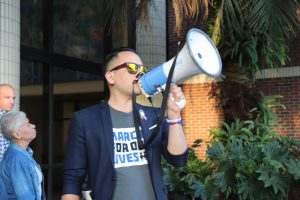State Rep. Carlos Guillermo Smith wears two ribbons pinned to his blazer: one is rainbow and the other is red.
The rainbow ribbon represents the 49 victims of the June 2016 mass shooting at an LGBTQ nightclub in Orlando. Last February, Guillermo Smith added a red ribbon for the 17 students and faculty members killed by a gunman at Marjory Stoneman Douglas High School in Parkland, Florida.
In the documentary “Uprising: Pulse to Parkland” screened Monday in the UCF Visual Arts building, Smith said he will continue to wear a ribbon for every mass shooting in Florida until tighter gun legislation is passed to prevent them.
“I don’t want to wear any more ribbons,” Smith said in the documentary.
Local Orlando filmmaker Vicki Nantz’s documentary is on the struggle progressive politicians have had pushing for gun control in the wake of both mass shootings. Smith partnered with Never Again UCF, a group founded by Douglas alumni that organized the March for Our Lives Orlando event, and the College of Democrats at UCF to show the film on UCF’s main campus.
“Uprising: Pulse to Parkland” followed the shooting at Pulse nightclub and the various gun legislation that was introduced to Congress before the Parkland shooting. The documentary also interviewed Florida Sen. Linda Stewart and Florida House candidate Anna Eskamani on gun control.
In January and August 2017, Stewart and Smith introduced a bill to Congress banning assault weapons, but it was denied a hearing both times. After the Parkland shooting, Stewart introduced an amendment that was heard last March.
The amendment was rejected, and instead the Florida Senate introduced the Marjory Stoneman Douglas High School Public Safety Act. This created the Coach Aaron Feis Guardian Program that allowed school staff to carry firearms and raised the age limit for purchasing a rifle from 18 years old to 21 years old. It also banned bump stocks and required a three-day waiting period after purchasing a firearm.
Aly Justice, a junior criminal justice major and vice president of March for Our Lives Orlando, said there are still improvements that need to be made with gun legislation.
“We’re not trying to take away your guns,” Justice said. “We’re trying to stop mass shootings.”
After the screening, Smith hosted a Q&A panel with Ricardo Negron, a Pulse survivor; Johanna Lopez, an Orange County school board candidate; Adrian Brice, a representative from Moms Demand Action, a “sensible gun legislation advocacy group, and Justice.”
Smith asked the panelists what needs to change in the U.S. for lawmakers to finally act and address gun violence.
Brice said getting people to talk about gun violence as a mainstream issue would put the topic back into the mainstream.
“We need to get out more and show people that you’re not alone in feeling this way, Brice said. “You’re not anti-second amendment and you’re not anti-American or on the extreme left to feel these things. “This is a mainstream, common sense position to take and I think we need to continue to build that momentum.”
Justice said the main thing people can do is keep the dialogue about gun control going for it to remain relevant in politics. She mentioned the mass shooting in Pittsburgh last weekend as an example.
“Parkland is already out of the news. It’s gone; we don’t see it anymore. Now we see Pittsburgh,” Justice said. “Give it two days and Pittsburgh is gonna be gone and then another shooting is gonna happen. In another two days gone.”
After the panel, Smith asked the audience of approximately 40 people if they would join him marching to UCF’s early vote site at the Live Oak Event Center.
Fiona Shannon is a member of Moms Demand Action and moved to the U.S. from New Zealand 24 years ago. Shannon said she understands the different perspectives on gun ownership, especially because her son is in the military and recently graduated from West Point.
Shannon participated in the march because she said it is time for both parties to come to a compromise about firearms that keep others – especially young children – safe from shootings.
“Personally, I would love it if there were no guns, but I know that’s not realistic,” Shannon said. “But at the minimum I think assault weapons need to be banned and there needs to be universal background checks.”
During the march, Smith used a megaphone to encourage students they passed on campus to follow and early vote.

Smith asked the march to tell him what democracy looks like.
“This is what democracy looks like!” the crowd shouted back.
While some students joined the march, others heckled the marchers. One man shouted “f—k socialism!” and Justice responded that March for Our Lives isn’t socialist.
“That happens sometimes when we’re out here,” Justice said. “They just don’t understand our movement. You keep going.”
Brendan Derrig, a junior political science major and president of the College of Democrats at UCF, said that events like this encouraging student voting is worth the effort.
“People come out, they learn more about the tragedies that befell our community, then they go out and do something to change it,” Derrig said.
Early voting sites on university campuses had been banned since 2016 until U.S. District Judge Mark Walker ruled it unconstitutional on July 24. Smith said he predicts the ruling will increase votes for Democratic politicians because young people tend to be more progressive.
Smith said events like the screening are important because the more people learn about the legislative process the more they will be inspired to change it.
“The only way to change the epidemic of gun violence is by voting,” Smith said. “There’s more of us than there are of them.”
The Live Oak Event Center is hosting early voting from 9 a.m. to 7 p.m. until Nov. 4.




